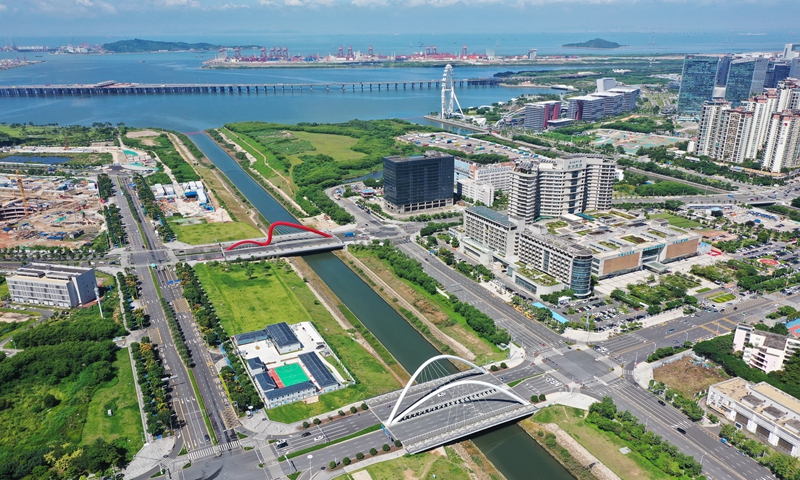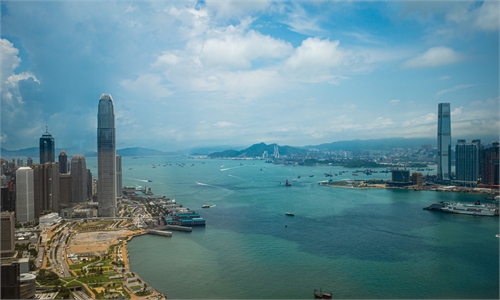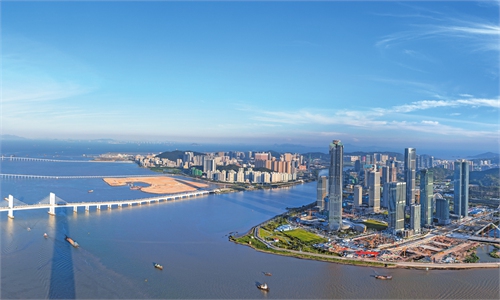Five years on, China's Greater Bay Area to see greater, more integrated development

Qianhai Shenzhen-Hong Kong Modern Service Industry Cooperation Zone in South China's Guangdong Province Photo: VCG
The Guangdong-Hong Kong-Macao Greater Bay Area (GBA) celebrated its 5th anniversary on Sunday. With an estimated economic output of more than 13.6 trillion yuan ($1.91 trillion) in 2023, the region is entering its best development phase now.
Observers said that with more emerging growth opportunities, the GBA could be looking forward to achieving an even brighter future.
Chinese authorities on February 18, 2019 released the outline development plan for the GBA, aiming to develop the region into "a role model of high-quality development."
Five years on, more than 600 measures have been announced to turn the blueprint into reality, and the economic output of the GBA is estimated to have exceeded 13.6 trillion yuan in 2023, said Zhu Wei, deputy director of the Development and Reform Commission of South China's Guangdong Province, during a recent interview with the Guangzhou Daily.
With less than 1 percent of China's territory and 5 percent of the population, the GBA has generated 11 percent of the country's GDP, becoming a driving force for high-quality economic development, per official data of 2022.
Cooperation in the GBA has made significant progress, Paul Chan Mo-po, financial secretary of the Hong Kong Special Administrative Region, wrote in his blog on Sunday on the 5th anniversary of the release of the plan.
Taking financial cooperation as an example, Chan said that the Overall Development Plan for the Qianhai Shenzhen-Hong Kong Modern Service Industry Cooperation Zone, announced in December 2023, backs up deepening the financial integration of Hong Kong and Shenzhen, South China's Guangdong Province.
This includes encouraging more Hong Kong-based banks and personal wealth management institutions to establish dedicated institutions in Qianhai (Guangdong), supporting eligible financial institutions to conduct cross-border securities investment business, and conducting cross-border pilot projects for digital yuan.
Chan revealed that a Wealth Management Connect 2.0 version will be officially launched on February 26, bringing more development opportunities to the Hong Kong business community and residents of the GBA, with an increased investment quota and a wider range of eligible products.
In addition to financial cooperation, the significant improvement in connectivity brought about by infrastructure networks has greatly enhanced the convenience and travel for individuals in the area.
The Hong Kong-Zhuhai-Macao Bridge facilitated trips for 144,000 passengers on February 13, setting a record since its opening in October 2018, China Media Group (CMG) reported.
The development of the GBA witnessed monumental changes during the past five years, for example, the infrastructure connectivity of the city cluster there makes it much more convenient to travel, Liu Guohong, director of the Department of Finance and Modern Industries at China Development Institute in Shenzhen, told the Global Times on Sunday.
"More important, the integrated development of cities within the GBA strengthens the advantages of the region - which boasts a competitive international financial center, trade center, shipping center and strong innovation corridor," Liu said.
Leveraging the advantages of the three places, the GBA has established itself as the top patent powerhouse among the world's four major bay areas, and has become a forefront of global technological competition in electronics, information technology, software, and pharmaceuticals, CMG reported.
Compared with other international bay areas such as Silicon Valley, the GBA has a notable advantage in large-scale industrialization capacity. "With a population reaching 90 million, the GBA itself is a huge consumption market," Liu said.
Consumption and daily life have become more convenient thanks to the one-hour life circle of the GBA. From February 9-15, which overlapped with the Spring Festival holidays, Hong Kong residents made nearly five times as many transactions in the Chinese mainland using WeChat Pay compared with 2023.
"Over the past five years, we've been keeping up with the plan. Now, it's convenient for people from Hong Kong to enjoy dining and shopping in various cities in the GBA, and many young people from Hong Kong are following the consumption trends of the Chinese mainland, which makes them know more about the mainland," Ken Wong, director of Hong Kong-based All Times Healthy Co, told the Global Times on Sunday.
"I hope that the GBA will attract more talent, keep up with innovation and technology development, and attract more investment from countries along the Belt and Road Initiative," Wong said.
Dismissing Western disinformation that capital is flowing out of Hong Kong, Liu said Hong Kong has a special opportunity as the development of the GBA is in full swing.
"Hong Kong can never be separated from the Chinese mainland. With improved capability in serving enterprises and visitors, capital will return to Hong Kong for opportunities," Liu said.
Hong Kong has great development potential in areas such as serving the Belt and Road Initiative with innovative financial services, digital finance and fintech, Liu noted.



